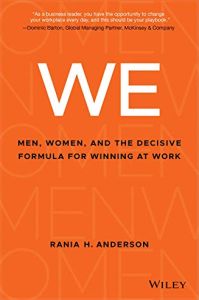Join getAbstract to access the summary!

Join getAbstract to access the summary!
Rania H. Anderson
WE
Men, Women, and the Decisive Formula for Winning at Work
Wiley, 2018
What's inside?
An investment in women is an investment in the future of business.
Recommendation
The corporate world’s success depends on diversity. Corporate leadership still underrepresents women because men don’t know how to address the problem of equality. Executive business coach Rania H. Anderson offers men the WE 4.0 Framework – “Eliminate, Expand, Encourage and Engage” – as a guide to the support and mentorship women need to succeed. Anderson relies on her experiences, not on primary research or comparative studies. As the #MeToo movement has shown, she says, professional conduct needs to go further than simply not exploiting and subjugating working women. Anderson urges men to use their power and influence to elevate women, help them fulfill their potential and build a professional environment in which everyone thrives. Institutional improvements aren’t sufficient; men need to engage women one-on-one to transform corporate culture. Anderson’s framework is deceptively simple, but her call to action is serious: Male leaders must address the gender equality gap, and they must start with respect.
Summary
About the Author
Rania H. Anderson is an international keynote speaker and the founder of TheWayWomenWork.com. She is an expert on women’s career advancement and an executive business coach.



















Comment on this summary